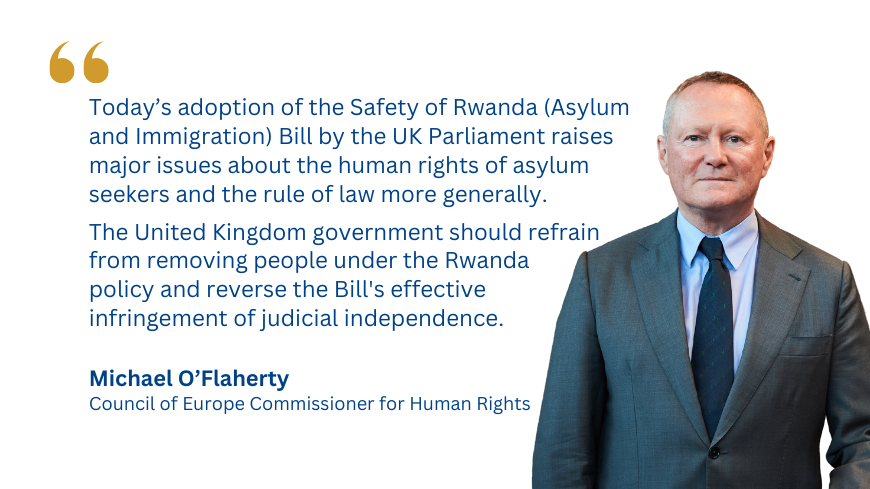“The adoption of the Safety of Rwanda (Asylum and Immigration) Bill by the UK Parliament raises major issues about the human rights of asylum seekers and the rule of law more generally”, said Michael O’Flaherty, the Council of Europe Commissioner for Human Rights. “The United Kingdom government should refrain from removing people under the Rwanda policy and reverse the Bill's effective infringement of judicial independence”, he underlined.
“Managing asylum and migration is undoubtedly a complex endeavour for states, but it must always be done in full compliance with international standards. In this regard, I am concerned that the Rwanda Bill enables the implementation of a policy of removing people to Rwanda without any prior assessment of their asylum claims by the UK authorities in the majority of cases. Specifically, the Bill prevents individuals faced with removal to Rwanda from accessing remedies for potential violations of the absolute prohibition of refoulement, while it also significantly excludes the ability of UK courts to fully and independently scrutinise the issues brought before them.
The Bill was proposed by the UK government in conjunction with a new treaty with Rwanda, following the UK Supreme Court’s finding, in November 2023, that persons removed to Rwanda faced a real risk of being sent onwards to their countries of origin, in violation of the principle of non-refoulement. The UK is prohibited from subjecting, even indirectly, people to refoulement, including under Article 3 of the European Convention on Human Rights, under the Refugee Convention, and under a range of other international instruments.
While the UK-Rwanda treaty contains certain provisions aimed at the prevention of refoulement, the Supreme Court’s judgment shows the importance of ensuring that people can seek independent judicial scrutiny of the alleged safety of a removal destination. However, the Rwanda Bill prevents individuals from having any meaningful recourse to UK courts in relation to the key question of refoulement, such as by excluding the examination of any claim that Rwanda will not act in accordance with its treaty commitments. The Bill requires decision makers to regard Rwanda as ‘safe’ for removal, regardless of the specific facts on the ground. It explicitly prohibits UK courts from considering the risk of Rwanda sending people onwards to other countries, as well as the fairness and effectiveness of asylum procedures in Rwanda. UK courts also cannot draw upon any interpretation of international law, including the European Convention on Human Rights, whilst large parts of the Human Rights Act 1998, which gives effect to that Convention in UK law, are disapplied. Finally, the Bill gives authority to a Minister of the Crown to decide whether to comply with interim measures issued by the European Court of Human Rights in relation to removal to Rwanda, notwithstanding that such measures are binding and that failure to comply with them undermines the right to individual petition guaranteed by the European Convention on Human Rights.
The Rwanda Bill’s adoption is another representation of an ongoing trend towards externalisation of asylum and migration policy in Europe, which is a matter of concern for the global system of protection of the rights of refugees. This is an issue that will have my early and close attention as Council of Europe Commissioner for Human Rights.”



